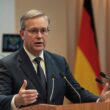The revelation of the so-called RKI Files has caused significant stir in Germany. Internal documents from the crisis team of the Robert Koch Institute have cast new light on the government’s COVID-19 policy and called into question decisions surrounding school closures, 3G regulations, and the obligation to wear FFP2 masks. These documents suggest that political decisions were often made without sufficient scientific basis, an accusation with far-reaching consequences.
A look at the protocols reveals that the 3G rule was “not justifiable on professional grounds” and there was “no evidence” for the FFP2 mask requirement. It appears that politics used science as a facade to justify measures that perhaps should never have been taken. The criticism of the government’s handling of the pandemic is thus not only justified but necessary.
It is telling that the media initially reported hesitantly on the RKI Files. Some even tried to downplay the explosiveness of the revelations. But the facts speak a clear language: There was a discrepancy between political action and scientific basis during the pandemic. This realization must lead to a comprehensive review and reorientation in crisis policy.
The RKI Files are a wake-up call. They show that transparency, scientific integrity, and critical media reporting are essential to act adequately in times of crisis. Only in this way can trust in political decisions be restored and future crises be better managed.





